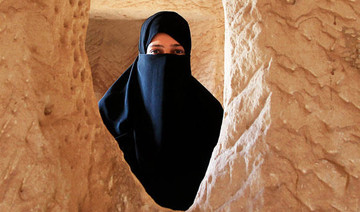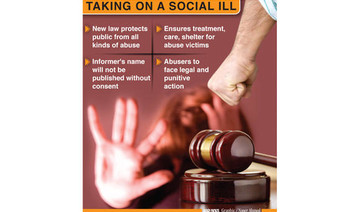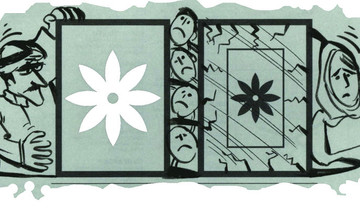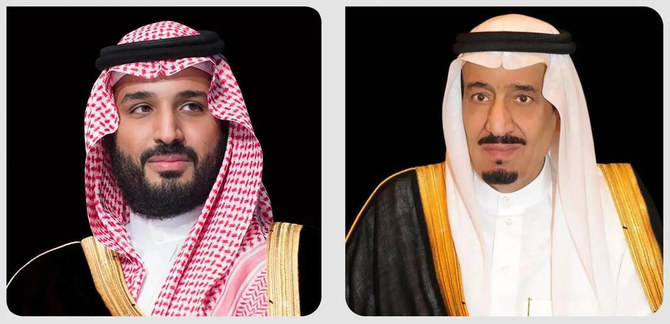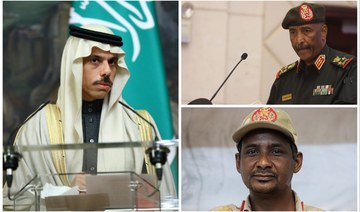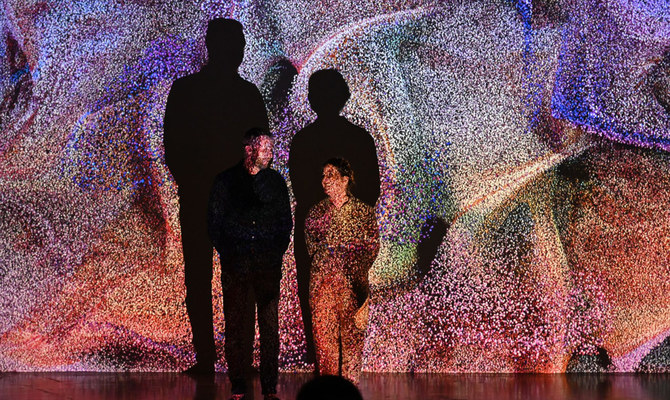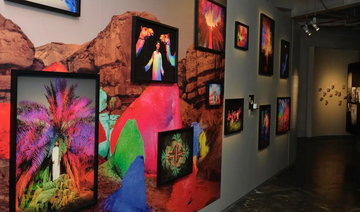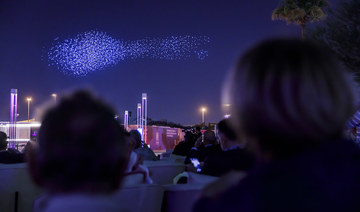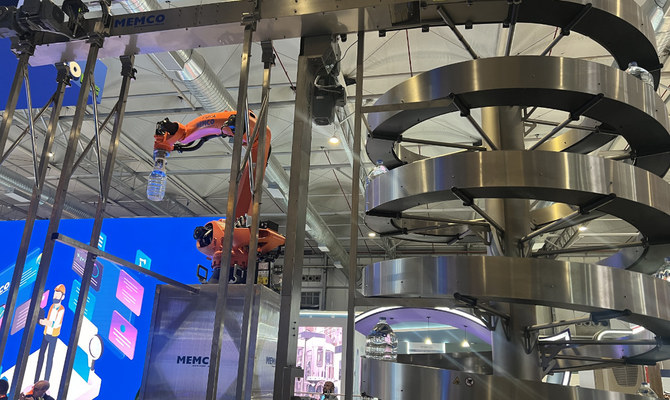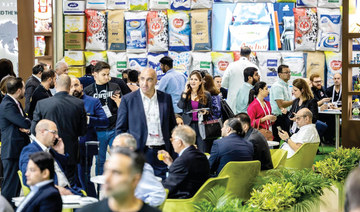JEDDAH: Twitter has become a platform for victims of domestic abuse in Saudi Arabia to speak out about their suffering, seek help and urge authorities to take action to change their fate.
Numerous Saudi women have taken to the social media site, with domestic violence incidents stirring up the nation several times.
A recent hashtag trending in the Kingdom about a viral video of a woman torturing her two 6-month-old daughters helped the protection unit save the children from their abusive mother.
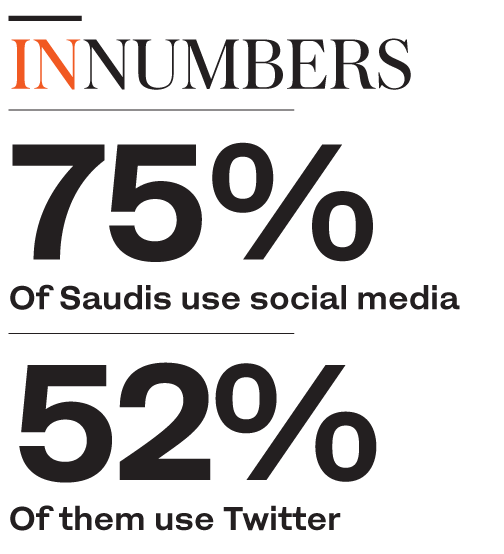 Another hashtag spread after a video was filmed and shared by a neighbor of an abusive husband, while a third video was self-generated by a daughter, pleading to be rescued from the clutches of her abusive father.
Another hashtag spread after a video was filmed and shared by a neighbor of an abusive husband, while a third video was self-generated by a daughter, pleading to be rescued from the clutches of her abusive father.
The three incidents received the attention of a Ministry of Labor and Social Development spokesman, who updated his followers when social protection intervened, investigated and/or apprehended the culprit.
Saudi therapist, pilot and social activist Nawal Al-Hawsawi told Arab News: “International movements like the most recent #MeToo in Hollywood have a global impact; they encourage victims to speak up and stop feeling ashamed and should instead shame their abusers.”
Al-Hawsawi believes that victims are utilizing social media as a result of international campaigns and grass-roots movements that focus on awareness — by educating victims and reminding them that what happened to them is not their fault. “Saudi Arabia is marching on toward globalization, and our culture is global. Victims of domestic violence are starting to speak up and feel empowered.”
During one of her campaigns, Al-Hawsawi challenged a common belief between Saudi women. “Domestic violence should not be swept under the rug and dismissed as a ‘family secret.’ It is a crime that needs to be reported,” she said. “Incidents like the girl from Hafr Al-Batin who tweeted photos of her body as evidence of domestic abuse give a voice to the voiceless.”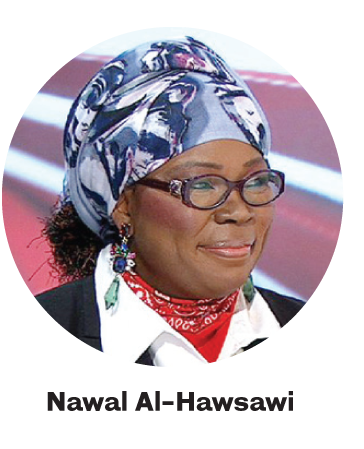
Al-Hawsawi urges victims of domestic violence to speak up. “In my private practice I see a lot of victims who still struggle with the trauma of growing up in homes where domestic violence took place. Women from the US, UK and Saudi Arabia, from their late 40s to late 60s, burst into tears from the vivid trauma — it is universal and needs to stop.”
Al-Hawsawi also shed light on a previous case that went viral, in which the victim’s brother, or legal guardian, abused the victim not only physically but also economically by blackmail. He would force her to give him her salary as a teacher or he would get her sacked.
“The way the system here in Saudi Arabia is set up, the victim has to go through so much to report domestic violence, and even after doing so, she has to face the consequences.
“If you’re complaining against your legal guardian, the guardian could isolate the victim, stir problems at her workplace. The only option left for these women is the protection home, which is basically prison,” Al-Hawsawi said.
The therapist believes more effective measures are needed to deal with offenders and victims of domestic abuse. “I reported a domestic violence case in Toronto, and within minutes police had apprehended the culprit who was immediately told he couldn’t come within a 100 meters of his wife and daughter. The victim received counseling and home visits by family organizations. Most importantly, she was allowed to stay in her home, with the perpetrator facing the consequences for his crimes.”
Seeking help is difficult for victims because abuse changes the way they think. “Giving up on a victim because she refuses help shows how ignorant we are about the psyche of the victim.”
Frequent abuse alters the victim’s personality, character, cognition and response to the perpetrator, as opposed to a normal person’s reaction to abuse, Al-Hawsawi said.
The victim can lose her sense of self-worth and the belief that she can survive without her abuser. In such situations, victims cannot think logically, and blame themselves for the situation they are in.
Al-Hawsawi said that she is seeing more male patients in her practice. Abuse is not gender-based, but is an issue that the entire human race faces and struggles with daily, she said.
However, the emergence of cases of domestic abuse on social media indicates victims’ distrust of established reporting mechanisms such as the hotline 1919.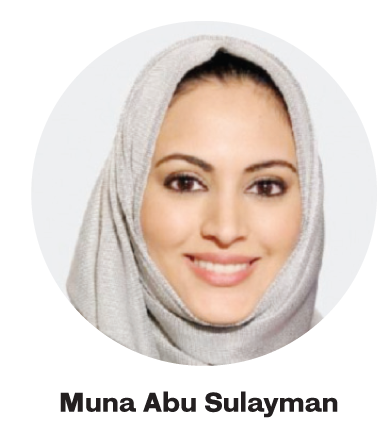
“It is an unfortunate turn of events that Twitter has become the de facto platform for many people to get justice,” said Muna Abu Sulayman, a Saudi media personality and activist who was appointed as a goodwill ambassador by the UN Development Program in 2007.
“They believe that no real action will be taken if there is no pressure from the public. It means that people don’t believe the normal avenues open to them work,” said Abu Sulayman.
A psychological viewpoint
Manal Kayal, an assistant professor in the psychology department at King Abdul Aziz University and a counselor and psychotherapist at the International Medical Center in Jeddah, supplied Arab News with a proper definition of domestic violence: “It is a pattern of coercive behaviors that may include: Physical, psychological, sexual, economic and emotional abuse, perpetrated by one person against another, with the goal of establishing and maintaining power and control over the victim. Many victims are not subjected to physical or sexual assault but they are controlled and terrorized by verbal, emotional and psychological abuse, as well as coercion, threats, isolation and intimidation.”
Domestic violence could result in physical effects that mark the victim, said Kayal. There are clear physical signs that a person is a victim of domestic abuse such as bruises, red or purple marks around the neck area, sprained or broken wrists. Longer-lasting effects include shortness of breath, muscle tension, involuntary shaking and fertility issues in women.
Most victims develop post-traumatic stress disorder, revealed Kayal. “PTSD can result in flashbacks, nightmares and severe anxiety, leading to uncontrollable thoughts,” she said.
“Victims of abuse are also prone to develop depression, experiencing hopelessness, helplessness, chronic fatigue, insomnia and suicidal thoughts or attempts. Additionally, victims could resort to alcohol or drug abuse.”
Kayal said that it is difficult for victims to seek help because abuse is not about inflicting harm but establishing power. By gaining control over the relationship through inducing fear, threatening, manipulating and physically harming the victim, they are creating a situation in which the victim feels helpless and incapable of changing the situation.
“I believe that each domestic violence case spread on social media needs to be individually looked at and investigated. It is difficult to generalize because each case has its motives, reasons and circumstances,” she said.
Law on domestic abuse
Speaking to Arab News, lawyer Dimah Al-Sharif said that the Law of Protection from Abuse is “taking care of this issue.”
“The legislator has criminalized all kinds of abuse, including domestic abuse,” she said.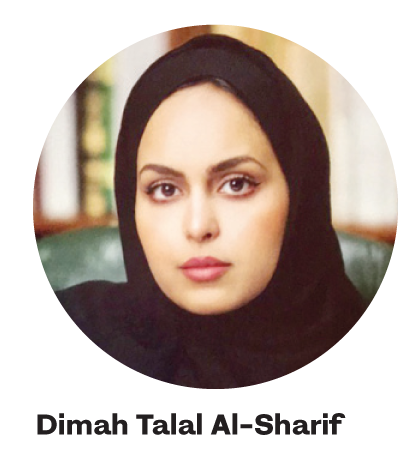
The law was approved on Aug. 23, 2013, but most people are not familiar with the regulations. “The Ministry of Labor and Social Development must increase its efforts to spread the culture of reporting and awareness in this regard.”
Lawyer Abdulrahman Al-Lahem commented on the case of a woman in Abha who was reportedly physically abused by her husband, saying that the person who reported the incident “did what every decent person, who respects the law and principles of humanity, should do.”
According to Article 3 of the Protection from Abuse Law, anyone who becomes aware of a case of abuse must report it immediately.
“The law protects the reporter’s identity,” said Al-Lahem, adding that the authorities were ignorant of this procedure in the case of a woman whose identity was disclosed after reporting a domestic abuse case in Abha.
Article 5 of the Protection from Abuse Law stipulates that “the identity of a person reporting a case of abuse may not be disclosed except with his consent, or in cases provided for in the Implementing Regulations. Ministry employees and those who become aware of such cases of abuse, by virtue of their employment, shall maintain the confidentiality of such information.”
In a TV interview, Al-Lahem said that all forms of abuse concern society and should be stopped.
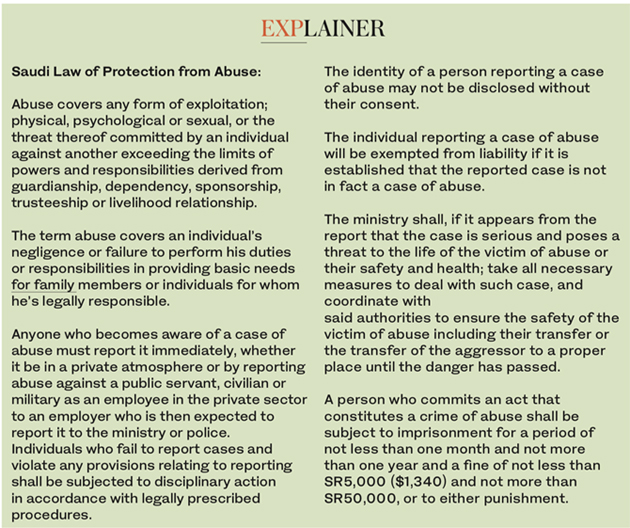
“The issue can not be resolved individually (each case separately); the solution must be through legislation of strict procedures applied institutionally, without having the victim begging on social media. Period,” he tweeted in a trending hashtag about another victim of domestic abuse — the Arabic hashtag reads #SaveTheAbusedEmmaAlzahrani.
Al-Lahem said that the abuse/violence file has become a phenomenon that requires an immediate response, “not only legally, but executive as well.”
“When the abused victim calls the protection line, there are many bureaucratic procedures to go through,” he said. He said that the bureaucratic Reconciliation Commission is the problem in these cases. “The victim comes with her body torn from a severe beating and then the protection body suggests that the victim reconciles with her abuser. What should be done instead is kicking the abuser out of the house and making him sign a pledge not to come near the house until the case is closed in accordance with legal procedures.”
Two types of people react to such incidents on social media: Sympathizers who try to spread abuse hashtags and get them trending on Twitter in order to notify the authorities, and those who attempt to falsify or bury the case and distract public opinion from the cause, instead shedding light on other issues, such as defamation.
“Defamation is a breach of privacy in which a person’s identity is revealed and this is how defamation is linked to fame. Photographing or filming a person to show a feature or character that appears to only apply to him/her,” he said, explaining that none of this happened in the video shared by a woman who reported an abuse case. “If there was a defamation case here, I wish the abuser complains so we can catch him,” Al-Lahem said to people who accused the reporter of defaming the abusive husband of Abha wife claiming that the husband’s reputation has been distorted because of the viral video, which only shows distress screams of a helpless wife. One of the drawbacks of social media reports, however, is inaccuracy. Some of the reported cases circulating such means of communication do not have solid grounds and may either be an unintentional misrepresentation of the actual incident or a mean to create a scene out of nothing on ground.
The law protects those who report abuse cases if they appeared to be well-intentioned, according to Article 6 of the Protection from Abuse Law, which stipulates that “a bona fide individual reporting a case of abuse shall be exempted from liability if it is established that such case is not a case of abuse, in accordance with the provisions of this Law.”
Early in 2017, Saudi women, once again, found a way to break their silence and expose stories of domestic violence, harassment and rape they face often on a daily basis through the viral hashtag #Break_Your_Silence_Speak_Up in which Saudi women started sharing their bitter stories that usually go untold.



